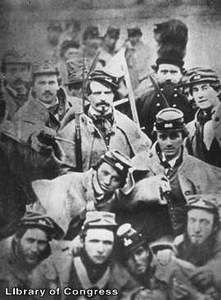 This month the Beaver Baptist Association of Lawrence County, Pennsylvania passes a resolution advocating “the confiscation of Rebel property” and “justice to all inhabitants of the land.”
This month the Beaver Baptist Association of Lawrence County, Pennsylvania passes a resolution advocating “the confiscation of Rebel property” and “justice to all inhabitants of the land.”
While enslaved Americans yet await freedom, white Baptists North and South live out their freedoms in a variety of ways. Today in Detroit, Michigan future Baptist clergyman, Isaac Wixom Lamb (1840-1906) secures patent # 39,934 “for a knitting machine capable of knitting not only tubular goods such as the legs and feet of hosiery, but flat, single-ribbed or plain work as well.” Lamb’s invention is the first flat (rather than circular) knitting machine designed in America. The following year Lamb moves to Rochester and founds the Lamb Knitting Machine Manufacturing Company, and in thereafter secures additional patents.
Business pursuits, however, ultimately leave Lamb unsatisfied. In 1869 he withdraws from the business world, retains his interest as an inventor, and is ordained as a Baptist minister in Michigan. For the next 30 years he pastors and, as a hobby, secures a number of new patents.
Meanwhile, in the Deep South town of Decatur, Georgia, Baptist layman Jesse Judson Newton (1846-1923) is discharged from the Confederate Army. As is later written of Newton:
J. J. Newton was a soldier in the Confederate army in Company K, 43rd Tennessee Infantry. This regiment was also known as the 5th East Tennessee Volunteers and as Gillespie’s Regiment. He volunteered for twelve months’ service on October 17, 1861 at Ooltewah, Hamilton County, Tennessee. James W. Gillespie was the enlisting officer. According to the records, he “absented himself without leave” from November 4, 1862 until some date in April (the 4th, 14th, or 24th). 1863, when he rejoined the regiment. He was captured at Vicksburg , Mississippi on July 4, 1863 , and was paroled five days later on July 9. He was discharged at Decatur, Georgia on September 15, 1863 because he had been under the age of conscription at the time he entered the service. At his discharge he was five feet, ten inches tall, had a dark complexion, black eyes, and black hair. Before he left the service he signed a receipt for back pay of $144.76.
Newton moves to Texas in 1867, where he marries and raises a family. In 1874 he becomes a founding father of Colleyville, Texas, and in 1877 becomes a charter member of Pleasant Run Baptist Church in Colleyville.
By the time of the deaths of Lamb and Newton, African Americans are free to be businesspersons or inventors, although majoritarian Southern whites are increasingly creating laws designed to suppress opportunities for blacks.
Sources: Robert F. Engs, Randall M. Miller, editors, The Birth of the Grand Old Party: The Republicans’ First Generation, Philadelphia: University of Pennsylvania Press, p. 116, 181 (link); Lamb, Isaac Wixom (link); Caryn Hannan, Jennifer L. Herman, Bryan Dye, Mel Ewald, Gloria Genel-Gonzalez, editors, Michigan Biographical Dictionary, St. Clair Shores, Mich.: Somerset, 1998, p 50 (link); Mike Patterson, “Pleasant Run Baptist Church History” (link)


